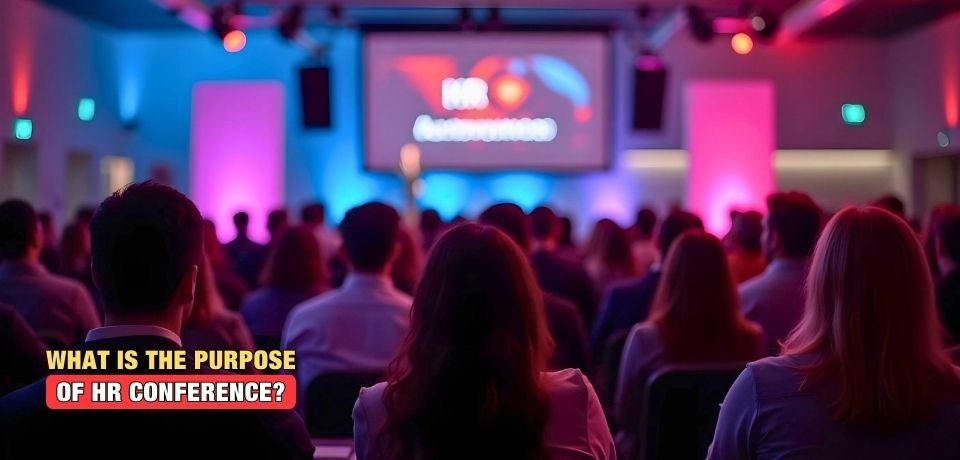Professionals from all over the human resources industry come together at HR conferences, which are lively events. These events are central to the HR community, offering a shared space for industry leaders, experts, and practitioners to connect and collaborate. This might lead you to ask: What is the purpose of HR conference?
The purpose of an HR conference is to provide a space where professionals can exchange knowledge, learn about industry trends, and gain insights into best practices. It offers networking opportunities, showcases new tools and technologies, and helps HR leaders refine their skills for more effective leadership and organizational impact.
Are you curious to know more about the importance of HR conferences? In this article, you will discover how these events can benefit you and your career, offering valuable insights and strategies to stay ahead in the field of human resources.
The Rise of HR Conference
At first, the growth of the HR conference was just a small group of enthusiastic HR professionals looking to share ideas. It quickly gained momentum as the role of HR in business grew more important. Over time, the conference became a vital event, attracting thousands of attendees from various industries and backgrounds.
In its early years, the conference mainly covered foundational HR topics like recruitment and employee relations. As the business world developed, so did the topics discussed. It started addressing leadership, diversity, and innovation in HR, focusing on how HR could drive organizational culture and align with business goals.
Today, HR conferences are global events that attract industry experts and HR leaders. It offers a platform to share strategies, discuss trends, and explore the evolving role of HR. The conference continues to be a driving force in shaping the future of human resources worldwide.
What is the Purpose of HR Conference?
HR conferences bring together professionals from various industries to discuss key trends and challenges within human resources. These events allow participants to share ideas, learn from experts, and gain insights into the evolving HR landscape. Below, you’ll find more detailed information about HR conferences.

Networking Opportunities
Professionals can network with others in the field in a great setting at HR conferences. These events attract people from various sectors, fostering valuable connections. Networking helps individuals share experiences, gain insights, and collaborate on future projects. Many attendees find career opportunities and partnerships during these gatherings. Networking allows for a diverse exchange of perspectives.
Learning and Development
Taking part in HR conferences provides opportunities for continuous learning and professional development. The events feature workshops and panel discussions led by industry experts. Attendees can stay informed about new trends, technologies, and best practices. These experiences help HR professionals develop new skills and improve their ability to handle challenges in the workplace.
Introduction to New Tools and Technologies
HR conferences are the perfect place to discover new HR tools and technologies. Attendees explore innovative software that streamlines HR processes, automates tasks, and enhances employee engagement. Knowing these developments enables HR professionals to apply more effective solutions. Keeping up with emerging technologies guarantees that HR directors can adjust to the constantly changing requirements of their positions.
Industry Insights and Trends
Conferences on human resources offer important insights into new developments and trends in the industry. Experts share their experiences and research on important issues such as remote work, diversity initiatives, and employee well-being programs. Attendees stay up to date with these developments, allowing them to make informed decisions. This knowledge helps HR leaders create strategies that align with future industry predictions.
Leadership and Career Growth
For professionals hoping to advance to leadership positions, HR conferences are essential. The events provide professional development sessions that focus on crucial leadership skills. Workshops teach attendees how to manage teams, handle conflict, and drive organizational change. These experiences help HR professionals build the necessary skills to advance in their careers and lead effectively in a dynamic workplace.
Collaboration and Best Practice Sharing
It encourages teamwork and the sharing of best practices at HR conferences. HR leaders often discuss their success stories, providing valuable insights into what works in various organizations. This exchange of ideas helps attendees find innovative solutions to the challenges they face. Collaborating with peers enables HR professionals to identify new strategies that can be implemented within their own teams.
Brand Visibility for Employers
HR conferences offer organizations a great platform to showcase their brand. Companies can participate in events to highlight their values, culture, and commitment to talent development. HR leaders can network with potential candidates and demonstrate why their company is an attractive place to work. Building a strong brand presence helps attract top talent and boosts employee retention.
Building a Supportive Community
By bringing together people dealing with similar issues, HR conferences assist professionals in creating a supportive community. These events create spaces for attendees to share experiences, struggles, and solutions, fostering camaraderie. This sense of belonging is valuable, especially for HR professionals who often work alone within their organizations. Building such a community provides long-term benefits for growth.
For professionals, HR conferences offer priceless chances to develop, learn, and network. Attending these events helps HR leaders stay current with trends, enhance their skills, and build networks that contribute to both personal and organizational success.
How to Attract and Engage HR Professionals?
Knowing the needs, interests, and motivations of HR professionals is essential to luring and retaining them. By focusing on relevant and thoughtful approaches, you can connect with them more effectively. Below are several key strategies to consider when reaching out.

Create Relevant and Engaging Content
HR professionals look for content that is both practical and thought-provoking. Conferences should provide a balanced mix of sessions that address current HR challenges and future trends. One important step to organize a HRM conference successfully is to focus on real-world applications, case studies, and interactive workshops to make the content more engaging.
Advance Networking Opportunities
The opportunity to network with colleagues is a major draw for HR professionals attending conferences. Providing ample opportunities for interaction can be key to attracting them. Arrange networking breaks, discussion groups, and social events to encourage meaningful connections and valuable discussions throughout the event.
Offer Expert Speakers and Thought Leaders
Inviting well-known experts and thought leaders can help build credibility for your event. HR professionals want to hear from people with a proven track record. Bringing in well-respected voices in HR not only draws attention but also keeps attendees engaged as they gain insights from the best in the industry.
Use Technology to Increase Engagement
A conference can be made more dynamic with the use of technology. Mobile apps, virtual sessions, and online Q&A tools can facilitate interaction during sessions. Integrating these tools helps keep HR professionals engaged, especially when combined with opportunities for them to interact with speakers and other participants.
Promote Continuous Learning
Career development and lifelong learning are important to HR professionals. Offering sessions that focus on skill development and future trends can make your event more appealing. Certification programs or professional development credits can further increase interest, encouraging HR professionals to participate actively throughout the event.
Engaging HR professionals demands consistent effort and genuine value. By offering helpful resources, personalized interactions, and networking opportunities, you can build strong relationships and keep their attention effectively. Stay relevant, authentic, and thoughtful in all communications.
What Are the Key Challenges in Planning an HR Conference?
Planning an HR conference involves careful coordination of multiple aspects to ensure a successful event. The challenges often stem from logistics, content, and audience engagement. Here are the key obstacles organizers might face during the planning process.
- Budget Management: Ensuring the conference stays within budget while delivering quality content can be difficult. It’s important to allocate funds wisely across different areas like venue, speakers, and marketing to avoid overspending.
- Speaker Selection: Finding relevant, knowledgeable, and engaging speakers for the event is crucial. Ensuring they align with the conference’s theme and goals can take time and may require extensive research or outreach.
- Audience Engagement: Keeping attendees engaged throughout the conference can be challenging. Balancing presentations with interactive sessions, networking opportunities, and engaging activities can help maintain interest and active participation.
- Event Logistics: Managing event logistics such as venue selection, catering, transportation, and technical setups requires meticulous planning. Delays or issues in these areas can cause significant disruptions during the event.
- Marketing and Promotion: Reaching the right audience with effective marketing is key. Using the right channels and strategies to promote the conference can be difficult, especially if the event is targeting a niche or specialized group.
- Technology Integration: With more events going virtual or hybrid, ensuring seamless integration of technology is vital. Technical glitches can impact the experience, so testing platforms and equipment beforehand is necessary.
- Time Management: Coordinating schedules for multiple sessions, speakers, and networking activities requires careful time management. Ensuring everything runs on time without rushing or delaying is crucial for attendee satisfaction.
Planning a successful HR conference requires attention to detail in managing budgets, selecting speakers, and ensuring smooth logistics. Overcoming these challenges helps create a memorable and valuable experience for both organizers and attendees.
Post-event Strategies: Measuring the Impact of Your HR Conference
Measuring the impact of your HR conference can be as challenging as organizing the event itself. Understanding how well the event met its objectives requires different methods and insights. Let’s break down key strategies for doing this effectively.

Gathering Attendee Feedback Post-Event
One of the most important ways to gauge the success of your conference is to get feedback from attendees. Surveys can provide deep insights into participant satisfaction, key takeaways, and areas needing improvement. As part of the HR conference organiser responsibilities, effective feedback collection helps ensure that future events align more closely with audience expectations and deliver more value.
Analyzing Engagement Metrics
To understand the success of your HR conference, analyzing engagement metrics is essential. Metrics like session attendance, audience interaction, social media activity, and app usage help measure the overall enthusiasm of participants. This data can show which sessions resonated and how the conference reached its audience.
Analyzing Networking Outcomes
Another important aspect of conferences is the opportunity for participants to network. Evaluating the impact of your HR event involves looking into the quality of these networking opportunities. Knowing how many meaningful connections were made or how many business leads were generated offers insight into the value attendees gained.
Assessing Knowledge Transfer Effectiveness
To measure knowledge transfer, you should evaluate how well attendees grasped the material presented during sessions. Follow-up quizzes, post-event discussions, and participant engagement can indicate the knowledge imparted. The role of an HR conference organizer extends to ensuring attendees leave with practical, actionable insights.
ROI and Business Impact Measurement
Finally, it is vital to assess the financial and business outcomes of your HR conference. Calculating the return on investment (ROI) involves comparing the costs against the benefits, such as brand recognition, lead generation, and partnerships. Understanding the true value generated helps determine the effectiveness of the event strategy.
Employing these strategies will provide a comprehensive view of how your HR conference performed and areas for improvement. Measurement is key to refining future events and delivering even greater value to participants.
Frequently Asked Questions
There are many chances to network, learn, and develop at HR conferences. Below, we answer some of the most frequently asked questions to help you better understand what makes these events so impactful and why they matter for HR professionals.
What Are the Typical Topics Covered in HR Conferences?
Talent acquisition, employee well-being, and HR technology innovations are just a few of the many topics that are covered at HR conferences. They often include discussions about strategic leadership, legal compliance, organizational culture, and innovations that impact the role of HR in business, keeping professionals up-to-date with industry evolution.
How Can HR Conferences Help Improve Employee Experience?
The HR conference provides strategies and tools that can be used to improve employee experience. They often feature discussions on employee engagement, mental well-being, and workplace inclusivity. By learning from successful case studies, HR professionals can implement new ideas and strategies that create more positive experiences for their employees.
Who Should Attend an HR Conference?
HR conferences are ideal for HR managers, recruiters, talent development specialists, and anyone involved in human resources. Whether you’re a seasoned HR leader or just starting your career, these events can provide the knowledge, skills, and contacts necessary to succeed and stay informed about industry trends.
What Makes HR Conferences Different from Regular Business Conferences?
The special requirements of human resources, such as organizational culture, compliance, and talent management, are the focus of HR conferences. Unlike general business conferences, HR events focus on the people’s side of business, providing specialized knowledge and practices that can help in managing and developing an organization’s most valuable asset—its people.
How Do HR Conferences Impact Organizational Success?
By strengthening HR professionals’ capacity to lead teams, attract talent, and enhance workplace culture, HR conferences can have a big impact on an organization’s success. Attendees gain practical knowledge and industry insights that allow them to implement best practices, ultimately helping their organizations achieve greater productivity and employee satisfaction.
End Note
HR conferences play an essential role in the growth and development of professionals in the human resources field. They provide valuable learning opportunities, allowing individuals to stay updated on the latest trends, tools, and technologies in HR. These events develop collaboration and create a space for sharing insights and experiences.
So, what is the purpose of HR conference? Simply put, HR conferences are designed to bring together HR professionals to discuss industry trends, enhance skills, and exchange innovative ideas. These events help attendees grow professionally while providing strategies to tackle current and future HR challenges effectively.
As you prepare for your next HR conference, keep networking, learning, and staying engaged in mind. Be proactive in connecting with fellow professionals and speakers, and take full advantage of the knowledge shared. Best of luck, and may your experience be both informative and inspiring!
